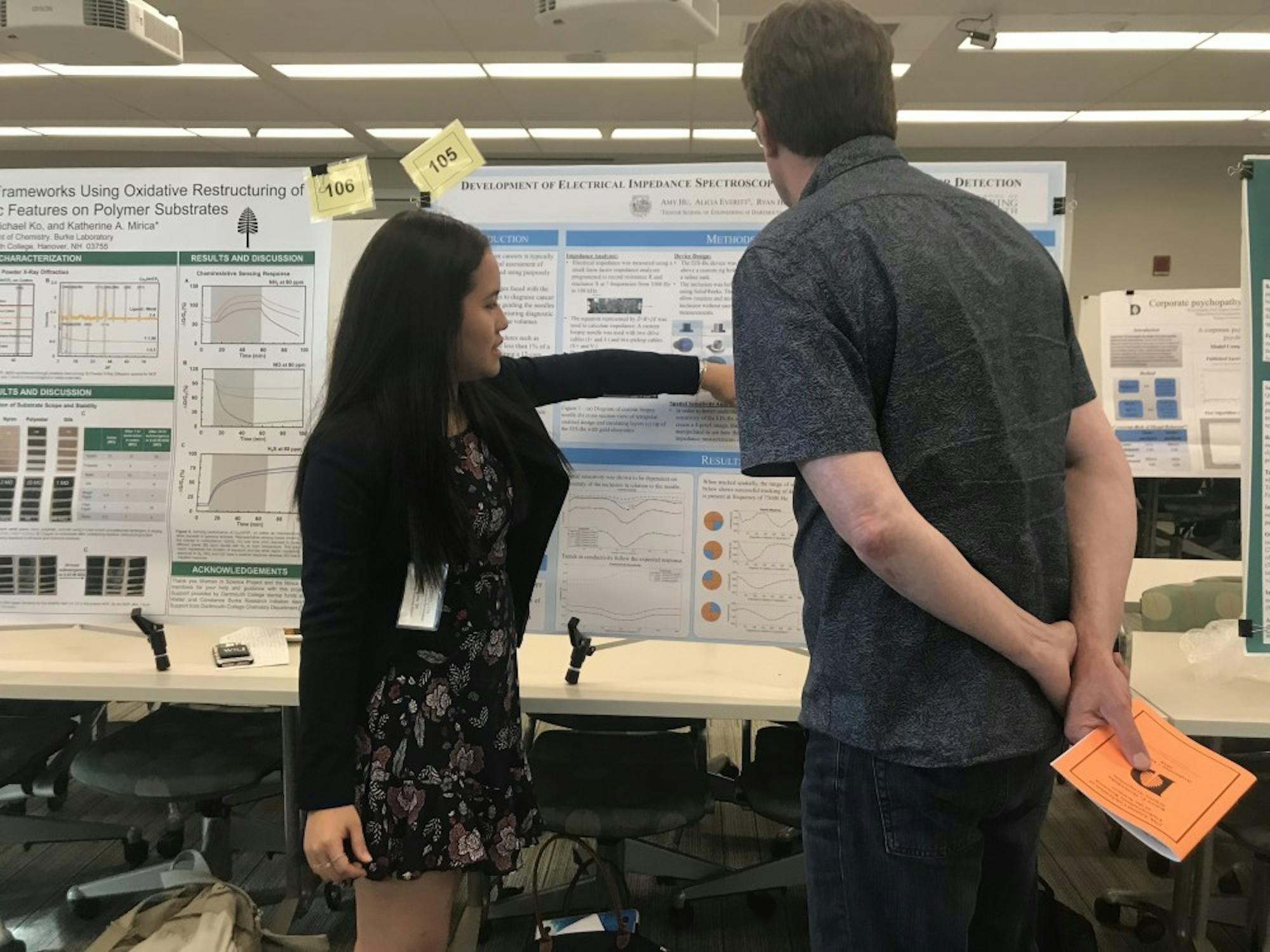“A little bit chaotic” is how Hannah Margolis ’20 described her preparation for the 2018 Karen E. Wetterhahn Science Symposium.
But just like science, the chaos turned to order by May 23, when more than 160 undergraduates showcased over 120 projects from 12 different disciplines in the halls of the Class of 1978 Life Sciences Center. Each project was also accompanied by one or more researchers ready to explain their work.
The event marked the 27th annual Wetterhahn Science Symposium, a celebration of undergraduate research in the sciences. The symposium — named for the late chemistry professor and Women in Science Project co-founder Karen E. Wetterhahn — is primarily sponsored by WISP, according to associate director of undergraduate advising and research and WISP director Holly Taylor. The symposium featured presentations by over 60 WISP participants along with Sophomore Science Scholars, Junior Scholars, Presidential Scholars and Senior Honors Thesis authors.
The symposium began with a keynote address by Juliette Madan, associate professor of epidemiology and pediatrics at the Geisel School of Medicine and clinical director of the Children’s Environmental Health and Disease Prevention Research Center at Dartmouth. In her presentation, Madan covered both her own research — focusing on microbe-human interactions beginning in infancy — and her path in science, medicine and research.
Because of the event’s history and partnership with WISP, the keynote speaker is usually a woman in science, Taylor said.
“[Madan’s] talk, I thought, was phenomenally interesting, and she did a great job of showing that the path in science is not a direct line; it’s lots of twists and turns and circles around,” Taylor added.
In addition to giving the event’s keynote address, Madan was able to attend the poster presentation portion of the event and had lunch with undergraduate researchers, according to Madan.
“I was particularly excited because I mentor a lot of women in science, and I felt it was important to participate and work with undergraduates,” she said. “Mostly, I work with medical students, residents and fellows, so it was very exciting to have the opportunity to interact with undergraduate women who are interested in careers in science.”
After the keynote address, awards were presented, including the Award for Library Research in the Sciences, the Sigma Xi Christopher Reed Competition prizes, the WISP Engagement Award and Sophomore Scholarships. The Award for Library Research in the Sciences honors students who have displayed “exceptional ability to locate, select, evaluate, and synthesize library resources ... and to use them in the creation of a project,” according to the library website. The Sigma Xi Christopher Reed Competition prizes recognize exceptional senior theses. The WISP Engagement Award “recognizes WISP Interns who have exhibited sustained engagement and enthusiasm about learning through research.” The Sophomore Scholarships “allow highly motivated and deserving Dartmouth [first-year] WISP interns to continue their research and mentoring experience [with their first-year mentors] during their sophomore year.”
Margolis was awarded one of two Awards for Library Research in the Sciences. She said she was excited to win the award for her research about mitochondrial autophagy, which is the process through which cells selectively degrade damaged mitochondria.
“I was really flattered to win the award,” Margolis said. “I pretty much live in [Kresge Physical Sciences Library]... so it was really sweet [to be recognized], after spending all of that time there.”
Saemi Han ’18, who won the other Award for Library Research in the Sciences and placed second in the Sigma Xi Christopher Reed Competition for senior honors theses, said that she found it meaningful for those who have supported her in her research to see the fruits of her labor.
“I felt really blessed to have won not one, but two awards,” Han said. “I think it was such a meaningful day in that so many people who have supported me throughout [the research process] were able to see my presentation and awards.”
Han added that she enjoyed participating in the symposium because it gave her the opportunity to showcase her thesis to people who may not be involved in the sciences themselves or those who are involved in other scientific disciplines. She explained that theses are not always the most “approachable” and that research posters and presentations are useful in explaining the research.
Gyan Moorthy ’20, who attended the poster presentation of the event following the award ceremony, said that he was impressed with the both the quality and quantity of presentations at the event.
“It floored me. It really did,” Moorthy said. “There were hundreds of posters, more than I’d expected. It was well organized, and there were so many titles that caught my eye.”
Eileen (Eily) Brady is a '21 from Chicago who studies government and romance languages. Eily loves travel, politics, iced tea and her dogs, Mac and Charlie. She is thrilled to be reporting the news for The Dartmouth.




![HONEYJOON_[Ines Gowland]_4.PNG](https://snworksceo.imgix.net/drt/7af2efc8-1bd1-4001-b754-e2718ce663b8.sized-1000x1000.PNG?w=1500&ar=16%3A9&fit=crop&crop=faces&facepad=3&auto=format)